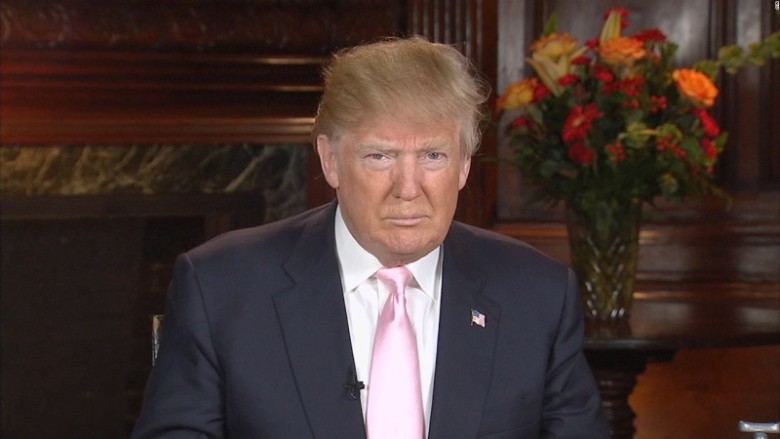
Donald Trump was scheduled to go on a satellite TV tour Tuesday morning, but it was scrapped at the last minute. He called into several morning TV shows by phone instead.
So what happened? He says there were technical glitches. Network sources say he didn't like the look of the live shot.
The sudden change left the networks scrambling. CBS decided not to interview Trump at all.
The off-camera drama highlights Trump's controversial use of phone interviews as a campaign trail tactic.
The frequent calls make Trump uniquely accessible, but some media critics say the networks should insist that candidates appear on-camera.
That's what he was going to do on Tuesday morning, an important primary election day in several states.
Trump was interviewed during the 6 a.m. hour on the CBS affiliate in Grand Rapids, Michigan and the Fox affiliate in Detroit. He was beamed in via satellite from Mar-a-Lago, his private club in Palm Beach, Florida.
There were no technical malfunctions visible to viewers during the interviews, but during the Detroit interview Trump interrupted his first answer to tell an off-camera staffer, "We have, by the way, a little double sound coming out of here, so it's a little hard to talk."
During the 6 a.m. hour, at least two engineers from other networks emailed Trump spokeswoman Hope Hicks with concerns about the lighting and audio.
He was scheduled to appear on the 7 a.m. morning news shows on NBC, ABC, CBS, Fox News, and MSNBC.
But Trump decided he'd do the rest of the interviews by phone.
Some of the networks offered alternatives so he could still be on-camera, but he declined.
Three network sources who insisted on anonymity said they thought the "technical issues" were an "excuse."
"He didn't like the shot," said one of the people who heard Trump voice his objection on camera. "But he didn't realize that his microphone was on for everyone to hear."
When guests appear on several shows back-to-back, the camera shot is often shared between them, so the guest can be seen and heard in multiple control rooms.
The source said they heard Trump say, "I don't like the way I look. Just tell them there's technical issues."
In response, Hicks told CNNMoney, "Not only was the look terrible, because the lighting was all screwed up, but we weren't able to connect to half of the stations he was supposed to be on with. Honestly, it was a disaster."
Related: The joke about Donald Trump's hands goes back nearly 30 years
One of the network morning shows, "CBS This Morning," has an informal rule against settling for phone calls. (The program waited for months for a Trump interview until he agreed to appear on-camera last month.) So that's why CBS skipped the Trump interview tour on Tuesday.
Executive producer Chris Licht tweeted, "Unfortunately @realDonaldTrump suddenly unable to join @CBSThisMorning via camera- we won't take on the phone- so we'll wait for next time!"
Licht picked up praise on Twitter for his no-calls stance, but some of his TV rivals think it's stuck-up and unnecessary.
The co-hosts of the MSNBC talk show Licht used to produce, "Morning Joe," addressed the issue right after their turn with Trump.
"Donald Trump has proved himself to be the most accessible candidate, like it or not," Mika Brzezinski said. "But don't blame us if the other candidates are not as accessible."
"Any candidate that wants to pick up the phone and call us, we'd love to have you on," Joe Scarborough added.
Related: Joe Scarborough on Donald Trump's 'disqualifying' moment
Televised phone calls from candidates were practically unheard of before Trump popularized the practice last year.
Trump was accustomed to calling into "Fox & Friends" for weekly segments even before entering the presidential race.
The major networks, including CNN, have let him call in dozens of times since then. "CBS This Morning" and "Fox News Sunday" are two of the exceptions to the rule.
The argument against calls: On-camera interviews take advantage of the medium of television and allow viewers to see how candidates handle questions. When a guest calls in, there is less accountability; someone could conceivably be helping the guest with answers.
The argument for calls: Guests like Trump are newsmakers and viewers benefit from hearing what they have to say. Calls are akin to radio interviews, which take place all the time between candidates and interviewers.
After his calls with the national programs on Tuesday, Trump also called into a local station in Biloxi, Mississippi, another state that is voting today. That interview was originally supposed to take place on-camera, too.
Representatives for the networks either declined to comment or did not respond to requests for comment.


